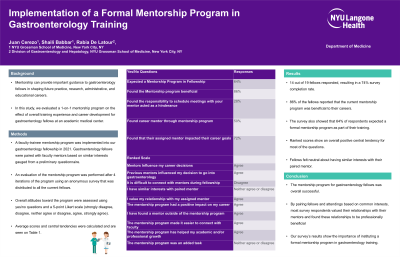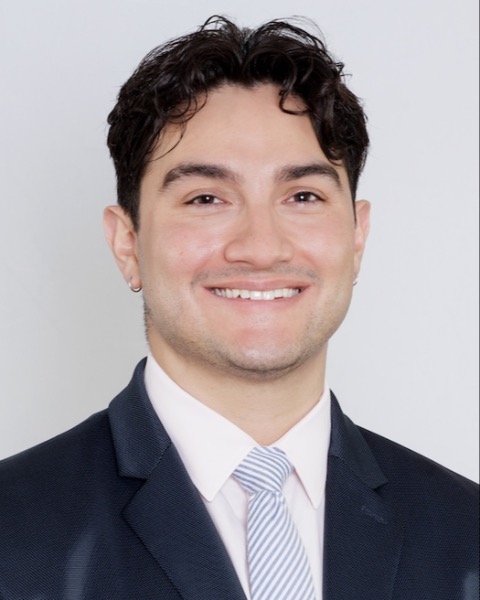Sunday Poster Session
Category: Practice Management
P1511 - Implementation of a Formal Mentorship Program in Gastroenterology Training
Sunday, October 27, 2024
3:30 PM - 7:00 PM ET
Location: Exhibit Hall E

Has Audio

Juan Cerezo, MD
NYU Grossman School of Medicine
New York, NY
Presenting Author(s)
Juan Cerezo, MD1, Shaili Babbar, MD2, Rabia De Latour, MD1
1NYU Grossman School of Medicine, New York, NY; 2New York University, Robbinsville, NJ
Introduction: Mentorship is a professional or personal relationship fundamental for career development in medicine. Mentorship can provide important guidance to gastroenterology fellows in shaping future practice, research, administrative, and educational careers. In this study, we evaluated a 1-on-1 mentorship program on the effect of overall training experience and career development for gastroenterology fellows at an academic medical center.
Methods: A faculty-trainee mentorship program was implemented into our gastroenterology fellowship in 2021. Gastroenterology fellows were paired with faculty mentors based on similar interests gauged from a preliminary questionnaire. An evaluation of the mentorship program was performed after 4 iterations of the program using an anonymous survey that was distributed to all the current fellows. Overall attitudes toward the program were assessed using yes/no questions and a 5-point Likert scale (strongly disagree, disagree, neither agree or disagree, agree, strongly agree). Average scores and central tendencies were calculated.
Results: 14 out of 19 fellows responded, resulting in a 74% survey completion rate. The questions and average responses are shown in Table 1. 86% of the fellows reported that the current mentorship program was beneficial to their careers. The survey also showed that 64% of respondents expected a formal mentorship program as part of their training. Ranked scores show an overall positive central tendency for most of the questions. Fellows felt neutral about having similar interests with their paired mentor.
Discussion: This mentorship program for gastroenterology fellows was overall successful. As it can be difficult for trainees to find faculty they connect with, this structured initiative provides a built-in path for individuals to meet one another. By pairing fellows and attendings based on common interests, the majority of survey respondents valued their relationships with their mentors and found these relationships to be professionally beneficial. During fellowship, trainees are solidifying their career goals and deciding how to integrate their academic interests into their clinical work. With their past experiences, mentors can provide guidance on these matters and serve as models for how specific career paths evolve over time. Our survey’s results are promising and indicate the importance of programs’ instituting a formal mentorship program in gastroenterology training.
Note: The table for this abstract can be viewed in the ePoster Gallery section of the ACG 2024 ePoster Site or in The American Journal of Gastroenterology's abstract supplement issue, both of which will be available starting October 27, 2024.
Disclosures:
Juan Cerezo, MD1, Shaili Babbar, MD2, Rabia De Latour, MD1. P1511 - Implementation of a Formal Mentorship Program in Gastroenterology Training, ACG 2024 Annual Scientific Meeting Abstracts. Philadelphia, PA: American College of Gastroenterology.
1NYU Grossman School of Medicine, New York, NY; 2New York University, Robbinsville, NJ
Introduction: Mentorship is a professional or personal relationship fundamental for career development in medicine. Mentorship can provide important guidance to gastroenterology fellows in shaping future practice, research, administrative, and educational careers. In this study, we evaluated a 1-on-1 mentorship program on the effect of overall training experience and career development for gastroenterology fellows at an academic medical center.
Methods: A faculty-trainee mentorship program was implemented into our gastroenterology fellowship in 2021. Gastroenterology fellows were paired with faculty mentors based on similar interests gauged from a preliminary questionnaire. An evaluation of the mentorship program was performed after 4 iterations of the program using an anonymous survey that was distributed to all the current fellows. Overall attitudes toward the program were assessed using yes/no questions and a 5-point Likert scale (strongly disagree, disagree, neither agree or disagree, agree, strongly agree). Average scores and central tendencies were calculated.
Results: 14 out of 19 fellows responded, resulting in a 74% survey completion rate. The questions and average responses are shown in Table 1. 86% of the fellows reported that the current mentorship program was beneficial to their careers. The survey also showed that 64% of respondents expected a formal mentorship program as part of their training. Ranked scores show an overall positive central tendency for most of the questions. Fellows felt neutral about having similar interests with their paired mentor.
Discussion: This mentorship program for gastroenterology fellows was overall successful. As it can be difficult for trainees to find faculty they connect with, this structured initiative provides a built-in path for individuals to meet one another. By pairing fellows and attendings based on common interests, the majority of survey respondents valued their relationships with their mentors and found these relationships to be professionally beneficial. During fellowship, trainees are solidifying their career goals and deciding how to integrate their academic interests into their clinical work. With their past experiences, mentors can provide guidance on these matters and serve as models for how specific career paths evolve over time. Our survey’s results are promising and indicate the importance of programs’ instituting a formal mentorship program in gastroenterology training.
Note: The table for this abstract can be viewed in the ePoster Gallery section of the ACG 2024 ePoster Site or in The American Journal of Gastroenterology's abstract supplement issue, both of which will be available starting October 27, 2024.
Disclosures:
Juan Cerezo indicated no relevant financial relationships.
Shaili Babbar indicated no relevant financial relationships.
Rabia De Latour: Boston Sci – Speakers Bureau.
Juan Cerezo, MD1, Shaili Babbar, MD2, Rabia De Latour, MD1. P1511 - Implementation of a Formal Mentorship Program in Gastroenterology Training, ACG 2024 Annual Scientific Meeting Abstracts. Philadelphia, PA: American College of Gastroenterology.
